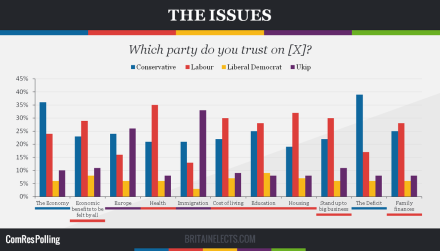On housing, standing up to big business, education, the cost of living, health, family finances and making sure economic benefits are felt by all, Labour are the most trusted party. Polling carried out by ComRes found that of the 11 subjects below, Labour led on seven, while the Conservatives and UKIP had the lead on two each. The Lib Dems came fourth on all but one of these issues.
Click to enlarge. Graphic by BritainElects:
The polling, carried out by ComRes for ITV News, finds that Labour’s biggest lead, perhaps unsurprisingly, is on managing the NHS, where they poll 14 points higher than the Tories.
This is followed by a 13 point lead on improving the affordability of housing, and an 8 point lead on both keeping down the cost of everyday items and standing up to big business. Labour also poll a 6 point lead on making sure economic benefits are felt by all, and 3 point leads on looking after family’s finances and improving education.
However, the Conservatives hold a 22 point lead over Labour on reducing the deficit, and a 12 point lead on promoting economic growth. UKIP lead on Britain’s relationship with the EU (2 points more than the Tories and 10 more than Labour), and on controlling immigration (22 points over the Tories, and 28 points over Labour). The phrasing of the questions does seem to have an effect here: Labour tend to poll worse on “controlling immigration” (as it is here) than they do when voters are just asked about “immigration”.
This polling was carried out before today’s announcements by Labour that they will increase education spending and cap class sizes for infants – it will be interesting to see if these policies have an effect on how people view Labour on education and the deficit.
ComRes also polled on Miliband’s row with business last week, and the numbers are promising for Labour.
– More people agreed that the disagreement showed Miliband was in touch with ordinary people (49%) than that he is a danger to the economy (27%).
– 38% of people think that Miliband is not a danger to the economy on the whole, compared to 36% who disagree.
– 41% say Miliband was criticised by business leaders because they don’t want to pay more tax; 37% thought it was because they are concerned about his handling of the economy.
– As many people think that governments should stand up to big business (40%) as think it’s important that a good relationship between government and big business is maintained.
– 39% believe business leaders should not get involved in politics, while 37% think they should.





More from LabourList
‘I was wrong on the doorstep in Gorton and Denton. I, and all of us, need to listen properly’
‘Why solidarity with Ukraine still matters’
‘Ukraine is Europe’s frontier – and Labour must stay resolute in its defence’